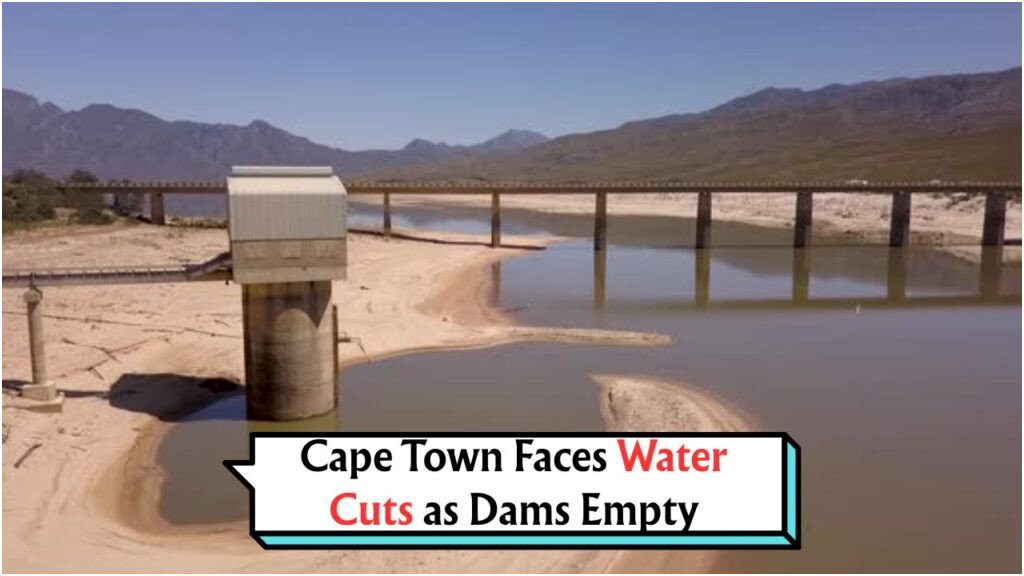Cape Town’s Water Crisis Deepens: Dam Levels Plummet Below 35% in August, ‘Day Zero’ Looms: Cape Town is once again grappling with a severe water crisis as dam levels have plummeted below 35% in August. The fear of ‘Day Zero’, when the city might run out of water, is looming large over residents. This alarming situation is a stark reminder of the critical importance of water conservation and the need for sustainable water management strategies. As climate change continues to affect weather patterns, the city must brace itself for potential water shortages. Authorities are urging residents to adhere strictly to water usage guidelines to mitigate the impact of this crisis. The situation has sparked discussions about long-term solutions and the role of government and communities in addressing water scarcity.
Understanding the Causes of Cape Town’s Water Crisis
The water crisis in Cape Town is a complex issue resulting from a combination of factors. Chief among them is climate change, which has led to unpredictable weather patterns and prolonged droughts. The city’s population growth has also put immense pressure on existing water resources, further exacerbating the problem. Moreover, aging infrastructure has made it difficult to efficiently manage the available water supply. These factors combined have created a perfect storm, putting Cape Town at risk of running out of water. To tackle this crisis, it is crucial to invest in infrastructure upgrades, promote water conservation efforts, and explore alternative water sources such as desalination and water recycling.
- Climate change and erratic weather patterns
- Rapid population growth
- Aging infrastructure
- Inadequate investment in water management
Current Dam Levels in Cape Town
| Dam | Capacity (%) | Previous Month (%) | Change (%) | Status |
|---|---|---|---|---|
| Theewaterskloof | 32% | 40% | -8% | Critical |
| Voëlvlei | 28% | 34% | -6% | Critical |
| Berg River | 35% | 42% | -7% | Alert |
| Steenbras Lower | 30% | 36% | -6% | Critical |
| Wemmershoek | 33% | 41% | -8% | Critical |
Impact on Cape Town’s Residents and Economy
The water crisis in Cape Town is not just an environmental concern but also a socio-economic one. Residents are facing stringent water restrictions, impacting daily life and increasing household expenses as they seek alternative water sources. The tourism industry, a significant contributor to the local economy, is also feeling the pinch. Events and conferences are being reconsidered or relocated, affecting business revenues. Furthermore, agriculture, which relies heavily on water, is suffering severe setbacks, leading to reduced crop yields and impacting food supply. The crisis has highlighted the need for resilient infrastructure and innovative solutions to ensure water security for all sectors.
- Stricter water restrictions for residents
- Increased costs for alternative water sources
- Negative impact on tourism and events
- Challenges for agriculture and food supply
- Need for infrastructure investment
Strategies to Mitigate ‘Day Zero’ in Cape Town
To address the looming threat of ‘Day Zero’, Cape Town must implement a multi-faceted approach. This includes enhancing water conservation measures and raising public awareness about the importance of saving water. The city is also exploring technological solutions such as desalination plants and expanding its water recycling programs. Additionally, investing in infrastructure to reduce leakages and improve distribution efficiency is critical. The government is working closely with local communities and businesses to develop sustainable practices and policies that ensure long-term water security. These efforts aim to build resilience against future water crises and secure the city’s water supply for generations to come.
- Promoting water conservation and public awareness
- Investing in desalination and water recycling
- Upgrading infrastructure to reduce water loss
- Collaborating with communities and businesses
- Developing sustainable water management policies
Innovative Solutions for Water Scarcity
| Solution | Description | Effectiveness | Implementation |
|---|---|---|---|
| Desalination | Converting seawater to potable water | High | Ongoing |
| Water Recycling | Reusing treated wastewater | Moderate | In Progress |
| Rainwater Harvesting | Collecting and storing rainwater | Variable | Adopted |
| Leakage Management | Reducing water loss through leaks | High | Ongoing |
Community Involvement in Solving the Water Crisis
Community involvement is a crucial element in addressing the water crisis in Cape Town. Local residents play a vital role in conserving water and promoting sustainable practices. Community-led initiatives, such as neighborhood water-saving competitions and educational workshops, have been effective in raising awareness and changing behavior. Additionally, partnerships between community organizations and local government can enhance resource management and mobilize collective action. Empowering communities through education and support will enable them to contribute meaningfully to solving the water crisis. By working together, Cape Town can develop a resilient and sustainable approach to water management, ensuring a secure future for all its residents.
- Encouraging community-led water conservation
- Promoting educational workshops and initiatives
- Fostering partnerships with local government
- Empowering residents through education and support
The Role of Technology in Water Management
Technology is set to play a transformative role in managing Cape Town’s water resources. Innovations such as smart water meters and leak detection systems help optimize water use and reduce wastage. These technologies provide real-time data, enabling city officials and residents to monitor consumption and identify inefficiencies. Furthermore, advancements in desalination technology are making it more cost-effective and sustainable. By integrating technology into water management strategies, Cape Town can improve its resilience to droughts and ensure a reliable water supply for the future.
- Implementing smart water meters
- Utilizing leak detection systems
- Advancing desalination technology
Government Initiatives to Combat the Water Crisis
The government of Cape Town is actively implementing measures to combat the ongoing water crisis. These initiatives include stricter water usage regulations and incentives for businesses and households that successfully reduce their consumption. Additionally, the government is investing in infrastructure projects to improve water distribution and minimize losses. Collaborative efforts with international organizations and experts are also underway to share knowledge and develop innovative solutions. Through these initiatives, the government aims to build a more sustainable and resilient water management system.
- Implementing stricter water usage regulations
- Providing incentives for reduced consumption
- Investing in infrastructure improvements
Looking Ahead: Preparing for Future Challenges
As Cape Town faces the threat of ‘Day Zero’, it is essential to look ahead and prepare for future challenges. This involves building a robust water management strategy that addresses both current needs and long-term sustainability. Emphasizing the importance of conservation, investing in technology, and fostering community engagement are key components. Moreover, continued collaboration between government, private sectors, and international partners will be crucial in developing innovative solutions. By taking proactive steps now, Cape Town can secure its water future and prevent similar crises in the years to come.
- Building a robust water management strategy
- Focusing on conservation and sustainability
- Fostering community engagement
- Collaborating with international partners
- Developing innovative solutions
Frequently Asked Questions (FAQ)
- What is ‘Day Zero’?
Day Zero is the day when Cape Town’s municipal water supply is expected to be depleted, leading to severe water rationing. - How can residents help conserve water?
Residents can conserve water by following usage guidelines, fixing leaks, and using water-efficient appliances. - What long-term solutions are being considered?
Long-term solutions include desalination, water recycling, and improving infrastructure to reduce water loss. - How is climate change affecting Cape Town’s water supply?
Climate change is causing erratic weather patterns and prolonged droughts, reducing water availability. - Are there any government incentives for water conservation?
Yes, the government offers incentives for businesses and households that successfully reduce their water consumption.





